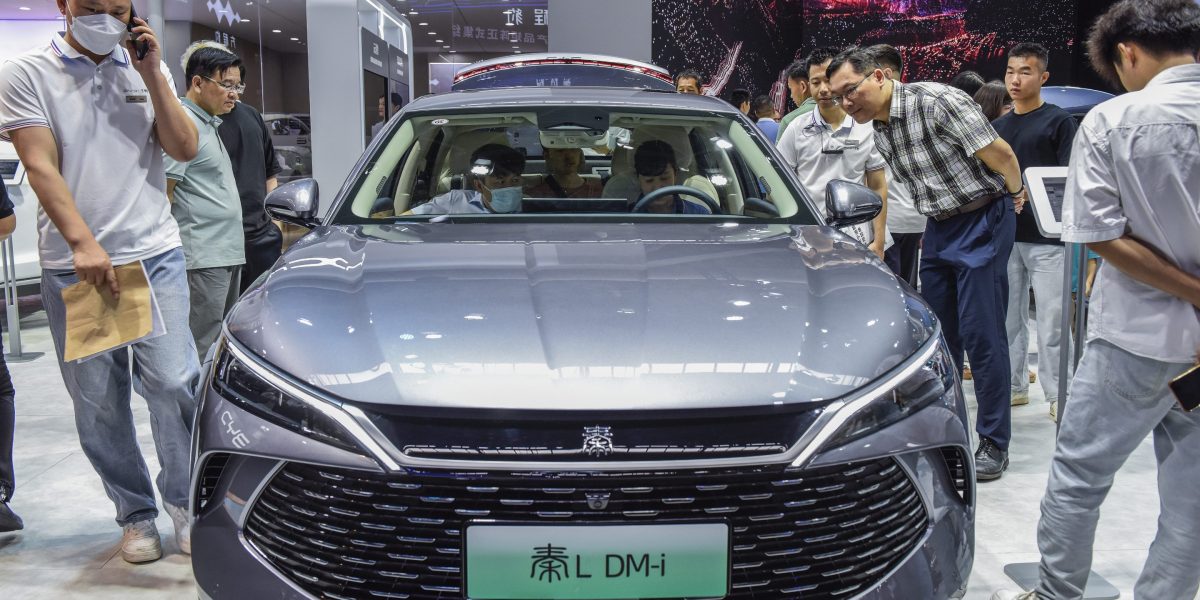They’re not wrong.
“Focus on your core,” Murphy said, speaking at an event organized by the Automotive Press Association where he presented the bank’s annual Car Wars report. “And China is no longer a core strategy to GM, Ford or Stellantis.”
Every American brand car in the past decade looks and acts like shit and is wildly overpriced. Foreign cars continue to outperform. And a few years ago, I would have gotten a Tesla until Musk revealed he was bat shit insane.
Tesla’s are basically screens on wheels.
It’s a computer with wheels.
So, you go ahead and build one then.
I read this as “We’re not competitive on a global market anymore, so let’s retreat into an shrinking niche, until we’re gone or someone buys us”.
Sure, they can’t compete in price, considering Chinese subsidies, but how about competing in the upper market, with quality and sophistication… Oh, wait… those are US car makers. They wouldn’t know quality if it smacked them in the face.
Well, then. Leave the low end to China and the high end to Germany and Japan then.
The corvette is the best track car for the price by far, same with certain camaros. And I’m not talking about Nascar tracks, I mean nordschleife times.
Is there enough of a market for Corvettes to support a global manufacturer?
Surprise, surprise. Bank who wants infinite growth of stock prices tells companies to lower costs to be more competitive. Guess where that will come from?
Either quality or labor costs. It isn’t coming from the CEO’s pockets.
The car industry execs should be laughing their heads off at naive bank execs assuming they know more about it than the car execs. Don’t they think the car execs already know what the risk and competitive nature of their own business.
Guess what bankers, this is how you produce positive growth in a real productive industry, and its risky business. Instead the bankers prescription assumes managed decline.
It’s like that new guy at work who constantly tells everyone about ‘hacks’ only they’ve discovered, when everybody already knows about them.
It’s very nice to see more non-Western alternatives.
I wish it was as simple as that, because I want the same thing. I just hate how American and Chinese auto industries seem very hand in glove with the government, albeit to varying degrees and with differing dynamics. It’s unsavoury in either case.
Edit: Everyone who responded to me had good opinions, I have nothing to add or take away
Union between state and mega corps is the standard everywhere it seems, we are just in denial about it because it would break normies brains
Yeah Detroit is literally the reason for THE ENTIRE COUNTRIES lack of good public transportation. The big three have and will continue to conspire deeply with the US government. Especially as that’s become commonplace among just about every corp rich enough these days.
Car infrastructure has always been funded out of public coffers. The personal automobile is not inherently a profitable enterprise to a country. It serves primarily as a way of improving personal mobility and thus second- and third- order economic productivity.
Subways and trains are vastly more efficient systems, but unfortunately they don’t have the same military logistics benefits.
In terms of actual companies, we’re seeing a bit of a renaissance with EVs because EVs are inherently simple, easy to commoditize, and don’t require as significant amounts of government support. China has basically cut government backing out of their EV industry, which has led to some consolidation but somehow has not ended the price war.
About military logistics and trains, are you sure you’re right? We aren’t supplying Ukraine by trucks last time I’ve seen a shipment
Transportation in general usually has a lot of public funding and government involvement. Tend to be common for air, sea, rail, and car transport solutions.
why is this a surprise? The roads these cars drive on are also publicly funded. There is no “car market” without public money. The main problem in the US is that the government isn’t pushing automakers in a useful direction by allowing heavy, wasteful vehicles to be the most profitable.
They actually gave them a loophole doing the exact opposite, vehicles with a bigger footprint had less strict mpg requirements.
This was written in 2011:
CAFE standards create profit incentive for larger vehicles
The current Corporate Average Fuel Economy standards create a financial incentive for auto companies to make bigger vehicles that are allowed to meet lower targets, according to a new University of Michigan study.
…
The loophole is the formula for setting mile-per-gallon targets. The standards, which actually depend on the sizes of vehicles automakers produce, are expected to require that firms boost average fuel economy to 35.5 mpg by 2016 and 54.5 mpg by 2025. Those oft-cited numbers are averages. In reality, each car company must meet a different standard each year determined by the literal “footprints” of the vehicles it makes. A vehicle’s footprint is its track width times its wheelbase.
According to the study, the sales-weighted average vehicle size in 2014 could increase by 1 to 16 square feet
https://news.umich.edu/cafe-standards-create-profit-incentive-for-larger-vehicles/
Auto industry can’t survive without government support. It’s a taxpayer subsidized industry.
Imagine wasting generations of state aid while saying China can’t build quality only to be punked and having to beg government if for more transfers from taxpayers.
Pathetic
Pay wall
Somebody needs to tell them about Buick in China.
Apparently decreasing sales, but half a million Buicks sold in 2023, plus the whole: “GM China sales decreased nine percent to 2,098,980 units during the complete 2023 calendar year. Sales decreased at all five brands marketed by GM in the Asian country, including Buick, Chevrolet, Cadillac, Baojun and Wuling.”
https://gmauthority.com/blog/2024/02/gm-china-sales-figures-numbers-results-2023-calendar-year/At that scale, it would be extremely embarrassing if GM can’t stay competitive & profitable.
I would buy a Wuling MiniEV, or a Bingo









